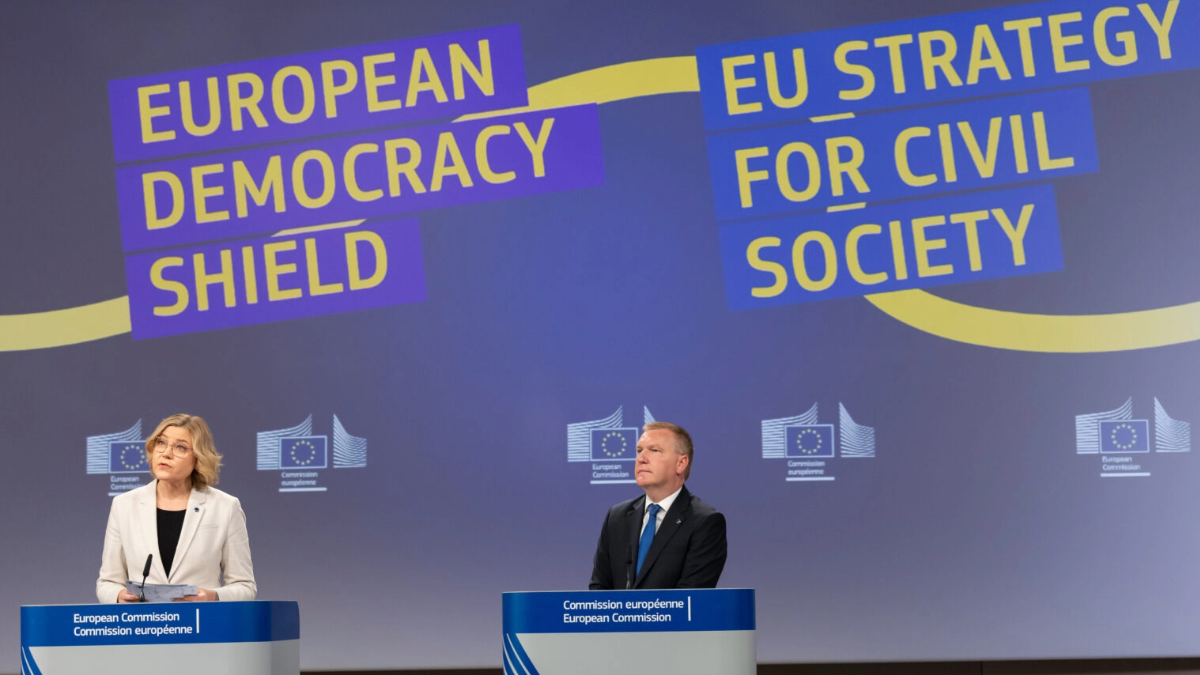Why the EU Democracy Shield Must Back Promises With Real Funding
Paula Gori / Nov 17, 2025Paula Gori is the Secretary-General and Coordinator of the European Digital Media Observatory (EDMO).

European Commissioners Henna Virkkunen (left) and Michael McGrath at the press conference on the European Democracy Shield and the EU Strategy for Civil Society. Source: European Commission
The long-awaited EU Democracy Shield (EUDS) was published last week. As its name suggests, it aims to protect democracy, something increasingly under threat both from within and beyond Europe. A shield stands between what must be defended and what endangers it. Today, democracy faces mounting pressure, especially through attacks on information integrity.
The European Commission's communication, titled "European Democracy Shield: Empowering Strong and Resilient Democracies," leans heavily on the concept of resilience. Borrowed from physics, it refers to the capacity to bounce back after stress. and Resilient Democracies.” But in democratic systems, resilience without prevention means we remain in a constant state of recovery. Repeated shocks, without long-term safeguards, can erode even the strongest institutions.
Prevention starts with enforcement. As the public discourse moved online, the enforcement of the Digital Services Act (DSA) is key. We must make sure that the online public space is safe, that its design and functioning do not create risks for democracy, that it is not manipulated and that it is not built by design to favor (hence impose) polarized and malign content and behaviors. In other words, precisely because we aim to respect freedom of expression and information, we need to ensure a level playing field for all. An uneven, unfair and unsafe public space is in contrast with democracy.
This brings us straight to a tool mentioned in the EUDS, namely the Code of Conduct on Disinformation (EDMO is a member of the Taskforce of the Code). VLOPSEs have, in principle, an interest in subscribing to and enforcing the commitments of the Code. Indeed, this can be evaluated as a risk mitigation measure under Article 35 of the DSA. However, they have respectively subscribed only to a number of measures (and X is not even a signatory anymore). The main roadblock appears to be uncertainty around how such commitments will be evaluated under the independent audit requirements of Article 37.
A solution lies in developing shared methodologies and templates for both risk assessments and audits. This would bring clarity, encourage renewed platform engagement, and improve comparability across companies and over time. It would also anchor transparency in structured, replicable procedures.
Beyond enforcement, the Code has broader potential. It was co-drafted by platforms, advertisers, civil society, and fact-checkers, a rare example of multi-stakeholder collaboration. Its flexible, inclusive structure makes it suitable for piloting resilience initiatives, supporting sandboxes, and embodying the whole-of-society approach endorsed by the EUDS. Expanding this network to include legacy media and influencer groups would only strengthen its legitimacy.
Information integrity guarantees plurality of public debate, access to information, and freedom of expression. There is no democracy without information integrity. ‘ Disinformation is not a single problem; it is a complex, evolving threat with many actors, motives, and methods. Addressing it requires coordinated action rooted in evidence. Encouragingly, the EUDS includes a section dedicated to evidence-based decision-making and academic freedom. This complements Article 40 of the DSA, which empowers independent research to identify and analyze systemic risks. Research needs funding to play its role.
But none of this can happen without funding. Independent researchers and infrastructures cannot operate on goodwill alone.
The EUDS recognizes the fragmented landscape of anti-disinformation efforts across Europe. It proposes new coordination mechanisms, “the European Centre for Democratic Resilience and the Stakeholders Forum,” to unify strategies. For these bodies to succeed, they’ll need operational tools. A public dashboard mapping threats, tactics, actors, and countermeasures would provide much-needed clarity, aid response coordination, and support transparency.
Fact-checkers are also central to this ecosystem. Fact-checkers play a role in de-bunking, pre-bunking, amplifying verified content (think of LLM training models), and building archives of verified content (including for historical memory purposes). The EUDS mentions the creation of a fact-checking repository accessible to journalists, platforms, and researchers. But the business model of independent fact-checkers is failing. Without adequate support, their role in preserving information integrity will collapse.
The EUDS also includes AI and media literacy, especially with the Media Resilience Programme, which aims to address citizens of all ages. This is a big success, as AI and Media Literacy tools and initiatives evolve with technological developments and need to be lifelong learning strategies. Integration, collaboration, and, when relevant, funding with current initiatives will avoid duplication of efforts. The programme will go hand in hand with specific actions in support of education in Member States.
Some important areas deserve more attention than they receive in the EUDS. GenAI is a growing vector for disinformation, from poisoning language models to automating agent-to-agent misinformation. These developments lower public critical thinking and demand focused regulatory and research responses. Similarly, the role of influencers, political advertising rules, and support for high-quality media, especially local outlets, are all critical to information integrity and merit deeper treatment in future plans.
The EU is built on democratic values. What we value most requires our highest protection. Without prevention and preparedness, and without real funding, those protections are hollow. The upcoming Multiannual Financial Framework negotiations must reflect this reality. If democracy fails, the EU fails.
Authors
